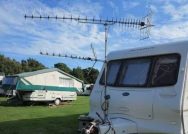
America’s latest RV trend: getting wa-a-ay off-grid
Recreational vehicle makers often boast how their RVs and trailers can feel just like home. Besides their cleverly packaged bathrooms and kitchenettes, when you park your rig at a campground you can find something else that will make you feel you never left home: neighbors.
Often lots of neighbors. Sometimes noisy ones. Just like at home.
That’s why a lot of campers these days are enjoying the seclusion of “boondocking,” or camping away from traditional campsites. And away from all those other campers.
“You drive around. You find yourself a spot, you don’t have any services of any sort,” said Amanda Watson who’s been living in a 1998 Safari motorhome with her husband for eight years. “That’s what I consider boondocking.”
RV’ing in general has become increasingly popular over the past few years. And that’s been especially the case recently, with the coronavirus keeping people away from shared lodgings. Now, even once-secluded spots are getting less secluded, especially if it’s near a cell-phone tower. Not having running water or sewer access is one thing, but apparently no one wants to be away from the Internet.
“We have discovered, particularly in the Southwest where the land is really wide open and the cell signal travels far, that we have gotten a good cell signal in some really remote places,” Watson said.
It’s a trend that has spawned numerous small startup companies, like Opus, Polydrops and EarthRoamer, to make trailers and recreational vehicles designed for venturing far from paved — or even unpaved — roads. Traditional RV companies, like Winnebago and Airstream, have also taken notice and are now turning out trailers and camping rigs with bigger, knobbier tires and more ground clearance to clamber over rocks and ruts.
Dry camping
Some homeowners rent out campsites that are often just easily accessible spots on their private land. But if you want to get to places that are more remote and away from drivable asphalt or gravel roads, you’ll want a rig designed for that.
Compact size is also important. You don’t want something that’s difficult to maneuver around boulders or between trees on the way to your secluded campsite.
About three years ago, California architecture student Kyunghyun Lew set out to design a camping trailer light enough to tow behind his wife’s Mazda3 or almost any SUV. He designed the Polydrop trailer, now available in four different styles from about $14,000 to $20,000, all of which resemble a space pod from a 1970’s science fiction movie. With air conditioning and heating, it offers a comfortable place to sleep. A fold out kitchenette is also available and Lew says he is also working on a built-in toilet. For now, campers will have to improvise.
Another company, Opus — founded in the United Kingdom but with its US headquarters in Pittsburg, California — offers rugged folding camping trailers. Advertised as “Tough Luxury,” most …
